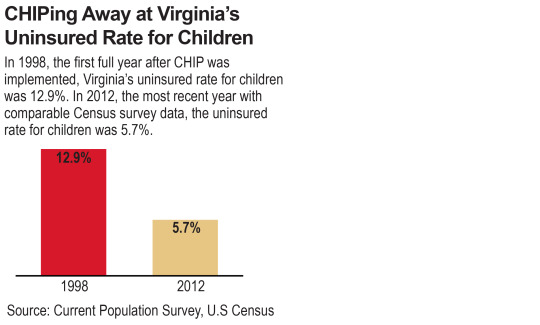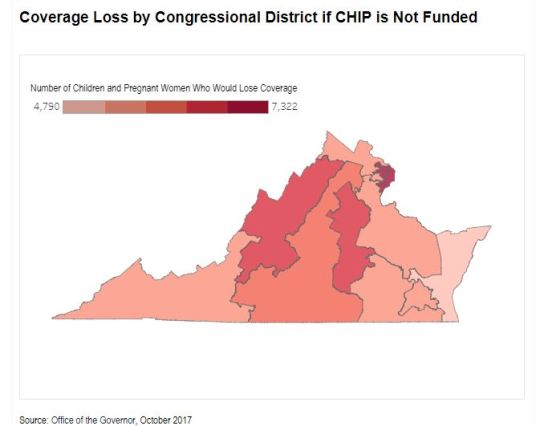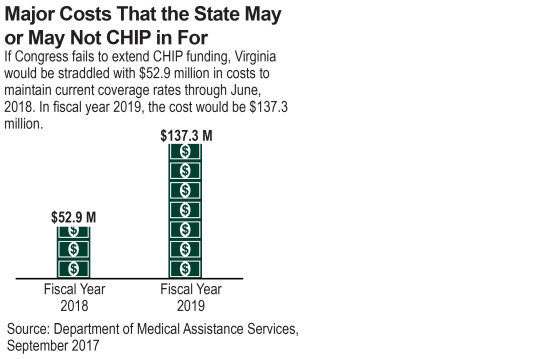October 31, 2017
Playing Chicken with Children’s Health Coverage
Termination notices are scheduled to be sent to thousands of Virginia families on December 1 letting them know that health insurance for their children will end early next year; that is, unless Congress takes steps to mitigate an impending crisis of their own making that would see around 65,000 Virginia children and 1,100 pregnant women lose their health coverage.
On September 30 this year, Congress failed to take a vote on legislation extending federal funding for the Children’s Health Insurance Program (CHIP), which provides most of the funding for Virginia’s FAMIS, FAMIS MOMS, and MCHIP services. These services provide health coverage for Virginia children and pregnant mothers who have family incomes between $20,420 and $41,861 (for a family of three).
The programs have been widely successful in contributing to the significant drop in uninsured Virginia children by extending coverage to many children in low-income working families who do not have access to employer-provided insurance. Since enactment in 1997, the uninsured rate for children in Virginia has dropped steeply from 12.9 percent in 1998 (the first full year of enactment) to 5.7 percent in 2012. (Note: 2012 is the most recent year that used the same surveying questions as the 1998 Current Population Survey.)

According the the Governor’s Office, Virginia will run out of federal funds for CHIP on January 31, 2018. Eleven states will run out of federal funds by the end of 2017.
That’s a major problem, as CHIP covers nearly 9 million children and 370,000 pregnant women nationally, and the federal government pays for about 90 percent of the costs. Continued inaction by Congress creates major challenges for states, who must either begin dis-enrolling children from their health insurance plans or find state dollars to make up the difference from the expiration of CHIP. The families of the approximately 65,000 children and 1,100 pregnant women in Virginia who stand to lose their coverage are unlikely to be able to obtain employer sponsored insurance, so doing nothing will in all likely scenarios result in extensive losses of coverage across the state.

Live version of the coverage loss map can be found here.
And there will be fiscal as well as human costs if Congress fails to act quickly. Some costs have already begun. The Virginia Department of Medical Assistance Services (DMAS) has indicated that they are already devoting staff time to planning the termination of CHIP and plan to send notices to families affected by December 1st. They have also indicated that unraveling this very complicated system will require significant resources from the department. Beyond these immediate administrative costs, Virginia would face large costs to maintain coverage for some or all of children and pregnant mothers who currently have coverage through CHIP. Some of those costs would be unavoidable, since Virginia is required to continue coverage for the approximately 58,000 children who are covered using CHIP dollars in the state’s Medicaid program even if the expiration of CHIP means the federal match rate is decreased from its current 88 percent to 50 percent. This will cost up to $26 million during the 2018 fiscal year that ends June 30, 2018, and up to another $68 million the following year. If Virginia wants to continue covering all children and pregnant women currently covered by CHIP funding, including the approximately 65,000 children and 1,100 pregnant women who are in Virginia’s FAMIS and FAMIS MOMS programs, we would need to apply for a state plan amendment to the Centers for Medicare and Medicaid Services and then contribute an additional $27 million in General Funds during the 2018 fiscal year and $69 million next year. Together, that’s $53 million in additional funds that would need to be found this year, and $137 million next year, despite the state’s tight financial situation.

State lawmakers are waiting for Congress to step up and pass legislation which would sustain and allow for expansion of CHIP funding for an additional five years. Doing so should not be controversial–CHIP has had bipartisan support since it was enacted in 1997. Unfortunately, debate has not even been scheduled yet for any of the CHIP extension bills in the Senate.
Should Congress fail to act quickly, Virginia policymakers will be faced with very difficult decisions–to fill in for federal inaction and use additional state dollars to continue health coverage for children and pregnant mothers or to tell thousands of Virginia families that their kids and pregnant moms will lose health coverage during periods in their life when they most need high quality health care. And either of those choices would be on top of the costs to Virginia to make up for lost federal funding for other low-income children who are covered using CHIP dollars in Virginia’s Medicaid program. Congress should act now to extend funding for CHIP and lift this impending threat from the shoulders of Virginia families.
Category:
Health Care
